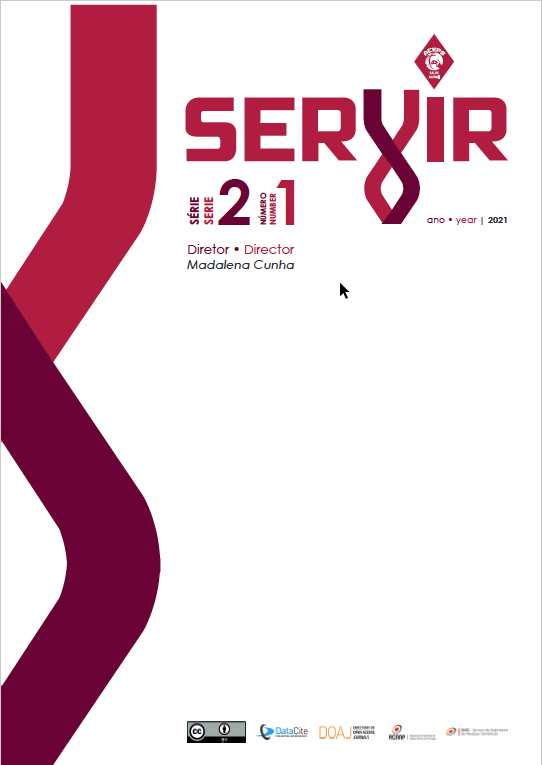Efficacy of cardiac rehabilitation on the quality of life of people
integrative literature review
DOI:
https://doi.org/10.48492/servir0201.25859Keywords:
heart disease, cardiac Rehabilitation, cardiac rehabilitation, quality of life, rehabilitation nursingAbstract
Introduction: Cardiac rehabilitation has proven to be an effective interventional strategy in promoting health, maximizing the patient’s quality of life (QoL).
Objective: Thus, this study aims to assess the effects of rehabilitation programs on the quality of life of people with heart disease.
Methods: An integrative literature review was conducted using electronic platforms of Scielo, Medline® (via PubMed®), Cochrane Central Register of Controlled Trials, MEDLINE, Embase and CINAHL (EBSCO) and Open Access Scientific Repositories in Portugal. Studies published between January 2015 and January 2021 were searched, respecting the previously established inclusion and exclusion criteria. The review corpus was composed of 7 articles.
Results: Cardiac rehabilitation programmes have been shown to globally improve the QoL of cardiac patients. These improvements have been found at thephysical, emotional and social levels, as well as in the management of cardiovascular risk factors. There is evidence of a short-term benefit through physicaltraining and the application of adapted exercises on people’s QoL
Conclusion: Cardiac rehabilitation programs are effectively a therapeutic resource with a positive cross-sectional effectiveness in the quality of life of people with heart disease. Thus, it becomes imperative for rehabilitation nurses to develop intervention programs that provide health gains and optimise the patients’ overall quality of life.
Downloads
References
Abreu, A., & Araújo, C. G. S. (2016). Conceito, componentes, fases e recursos humanos e materiais da Reabilitação Cardíaca. In A. Abreu, C. G. Araújo, M. Mendes, & S. Serra (Eds.), Prevenção e Reabilitação Cardiovascular (1ª edição ed.): Sociedade Portuguesa de Cardiologia.
Bolas, R. (2017). Capítulo IV- Pessoa em programa de Reabilitação cardíaca. In Marques-Vieira, Cristina e Sousa, Luís- Cuidados de Enfermagem de Reabilitação á pessoa ao longo da vida (pp.381-391). Loures: Lusodidacta. ISBN: 978-9898075-73-4,
Choo, C.C.; Chew, P.K.H.; Lai, S.-M.; Soo, S.-C.; Ho, C.S.; Ho, R.C.; Wong, R.C.(2018). Effect of Cardiac Rehabilitation on Quality of Life, Depression and Anxiety in Asian Patients. Int. J. Environ. Res. Public Health 2018, 15, 1095. https://doi.org/10.3390/ijerph15061095
Costa, F.A.A. da, Clemente, C.E.T., Ueno, F.H., & Motta, A.R. (2017). Fatores de Risco Cardiovasculares em Lesões Coronarianas Críticas: Mito ou Realidade? International Journal of Cardiovascular Sciences; 29(5), 378-384. doi: 10.5935/2359-4802.20160058
Direção Geral de Saúde (DGS).(2017).Relatoriodo Programa Nacional para as Doenças cerebrovasculares 2017. https://www.dgs.pt/em-destaque/relatorio-do-programa-nacional-para-as-doencas-cerebro-cardiovasculares-2017.aspx
Delgado, B., Lopes, I., Loureiro, M., Mendes, E., Novo, A., & Preto, L. (2020). Reabilitação Cardíaca- Realidade Portuguesa. Lsboa: Lusodidacta.
Fernandes, R.F.P. (2018). O Exercício Físico na Gestão da Doença Cardíaca: Intervenção do Enfermeiro Especialista em Enfermagem de Reabilitação. (Dissertação de Mestrado). Escola Superior de Saúde de Lisboa. Acedido em https://comum.rcaap.pt/bitstream/10400.26/25265/1/O%20Exerc%C3%ADcio%20F%C3%ADsico%20na%20Gestão%20da%20Doença%20Card%C3%ADaca%20Intervenção%20do%20Enfermeiro%20Especialista%20em%20Enfermagem%20de%20Reabilitação.pdf
Francis, T., Kabboul, N., Rac, V., Bielecki, J., Alter, D., & Krahn, M. (2018). The Effect of Cardiac Rehabilitation on Health- Related Quality of Life in Patients With Coronary Artery Disease: A Meta-analysis. Canadian Journal of Cardiology; Vol. 35, 3, doi:https://doi.org/10.1016/j.cjca.2018.11.013
Khalife-Zadeh, A., Dorri, S., & Shafiee, S. (2015). The effect of cardiac rehabilitation on quality of life in patients with acute coronary syndrome. Iranian journal of nursing and midwifery research, 20(5), 588–593. https://doi.org/10.4103/1735-9066.164504
Marita, I., Sastradimaja, S.B., & Tiksnadi, B.B. (2017). Effect of Short Term Cardiac Rehabilitation Program on Quality of Life in Patients with Coronary Artery Disease. AMJ.; 4(3), 479-85. doi: http://dx.doi.org/10.15850/amj.v4n3.1207
McGregor, G., Powell, R., Kimani, P. & Underwood, M. (2020). Does contemporary exercise-based cardiac rehabilitation
improve quality of life for people with coronary artery disease? A systematic review and meta-analysis. BMJ Open;10: e036089, 1-19. doi:10.1136/bmjopen-2019-036089
Mediano , F.F., Mendes , F.S.N.S., Pinto, V.L.M. et al. (2017). Reassessment of quality of life domains in patients with compensated Chagas heart failure after participating in a cardiac rehabilitation program. Rev. Soc. Bras. Med. Trop.; vol. 50, 3, 404-407. https://doi.org/10.1590/0037-8682-0429-2016
Mohammed, H.G., & Sanaba, A.M. (2018). Effect of cardiac rehabilitation on cardiovascular risk factors in chronic heart failure patients. The Egyptian Heart Journal; Vol. 70, 2, 77-82. https://doi.org/10.1016/j.ehj.2018.02.004
Novo, A., Delgado, B.,Mendes, E., Lopes, I., Preto, L., Loureiro, Maria de Fátima de Sequeira (2020). Reabilitação cardíaca - evidência e fundamentos para a prática: Loures: Lusodidacta. ISBN: 978-989-8075-92-5.
OCDE (2019). State of Health in the EU · Portugal · Perfil de saúde do país 2019. https://ec.europa.eu/health/sites/default/files/state/docs/2019_chp_pt_portuguese.pdf
Ordem dos Enfermeiros. Regulamento n.º 392/2019: Regulamento das competências específicas do Enfermeiro Especialista em Reabilitação [em linha], Lisboa: Diário da República n.º 85/2019, Série II de 2019-05-03, 2019.
Pessoa, J. (2019). Intervenção do fisioterapeuta e do enfermeiro na reabilitação cardíaca após infarto agudo do miocárdio: uma revisão integrativa. Temas em Saúde; Vol. 19, 2, 300-320. ISSN 2447-2131
Pires, M. M. (2018). A Reabilitação Cardíaca em Contexto Comunitário: aptidão física funcional da pessoa idosa com doença cardiovascular. Obtido de https://www.repository.utl.pt/handle/10400.5/15604
Relatório do Estudo e_COR – Prevalência de Fatores de Risco Cardiovasculares na População Portuguesa (2020). Instituto Nacional de Saúde Doutor Ricardo Jorge. Acedido em https://www.sns.gov.pt/noticias/2020/02/04/fatores-de-risco-cardiovasculares/
Ritchey MD, Maresh S, McNeely J, et al. (2020). Tracking Cardiac Rehabilitation Participation and Completion Among Medicare Beneficiaries to Inform the Efforts of a National Initiative. Circ Cardiovasc Qual Outcomes; 13:e005902.
Silva, S., Nóbrega, T., Chaves, N., Nogueira, M., & Arriaga, M. (2017). Estratégias de enfermagem na promoção da atividade física. Revista Fatores de Risco, 44, 84-97. Sociedade Portuguesa de Cardiologia.
Su, J.J., & Yu, D.S.F. (2019). Effectiveness of eHealth cardiac rehabilitation on health outcomes of coronary heart disease patients: a randomized controlled trial protocol. Su and Yu BMC Cardiovascular Disorders; 19, 274. https://doi.org/10.1186/s12872-019-1262-5
Vasco, J.M.G.G. (2018). Reabilitação Cardíaca – a segunda oportunidade do coração. (Dissertação de Mestrado). Faculdade de Medicina de Lisboa. Acedido em https://repositorio.ul.pt/bitstream/10451/42255/1/JoaoGVasco.pdf
World Health Organization (2017). Media Centre: Cardiovascular disease: WHO. http://www.who.int/mediacentre/factsheets/fs317/en/
Downloads
Published
How to Cite
Issue
Section
License
In order to promote the free circulation of knowledge, Servir is open access journal. All its content is available and protected under the Creative Commons license (CC BY 4.0).
The journal allows self-archiving in institutional repositories of all versions, which may become immediately available


